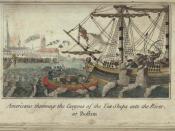As the British and Colonists were engaged in the Seven Years War against the French and Indians, the colonists were slowly building up feelings for their removal from under the British crown. There had been several uprisings to overthrow the colonial governments. When the war ended and the British were victorious, they declared the Proclamation of 1763 which stated that the land west of the Appalachians was to be reserved for the Native American population. The colonists were confused and outraged and the now ambitious social elite's were raring to direct that anger against the English since the French were no longer a threat. However, the social elite was a miniscule percentage of the colonial population. As documented in city tax lists, the top 5% of Boston's taxpayers controlled 49% of the cities taxable assets. The lower classes then started to use town meetings to express their feelings. Men like James Otis and Samuel Adams from the upper classes formed the Boston Caucus and through their motivational speaking, molded and activated the laboring-class.
After the Stamp Act of 1765, the British's taxation of colonists to pay for the Seven Year War, the lower-class stormed and destroyed merchant homes to level the distinction of rich and poor. A hundred lower-classmen had to suffer for the extravagance of one upper-classmen. They demanded more political democracy in which the working class could participate in making policies.
In 1776 elections for the constitutional framing of Pennsylvania, a Privates Committee urged the opposition of rich-men in the convention. Even in the countryside, there were similar conflicts of rich against poor. Several riots in the New York/Jersey area were more than riots but long lasting social movements to create counter governments. Rioters were breaking into jails and freeing their friends. Soon however, the lower-classmen...


